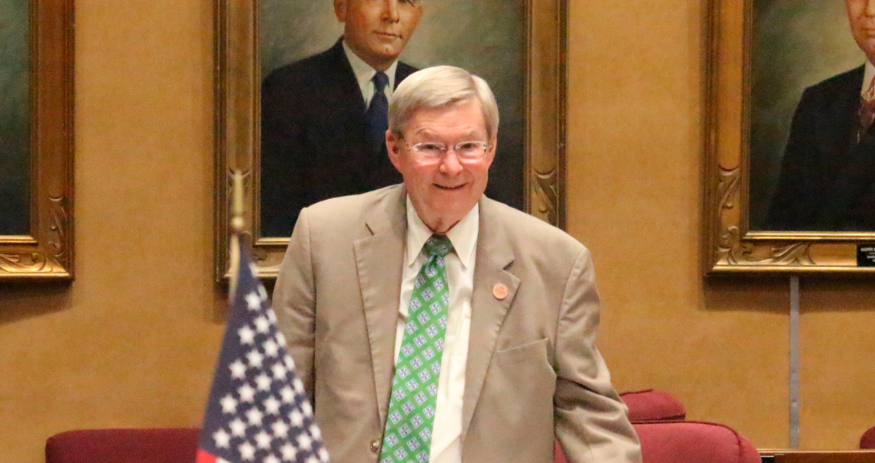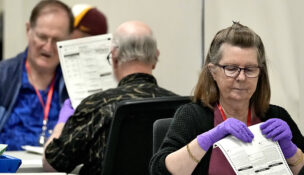Voter decisions on propositions are nearly permanent, thanks to Voter Protection Act
Howard Fischer, Capitol Media Services//October 8, 2024//[read_meter]
Voter decisions on propositions are nearly permanent, thanks to Voter Protection Act
Howard Fischer, Capitol Media Services//October 8, 2024//[read_meter]
Every measure on the 2024 ballot comes with a word of warning: Make sure this is what you really want to do.
The reason?
They are pretty much permanent. The Arizona Constitution spells out that anything approved by voters cannot be repealed by the Legislature. The issue would have to go back to voters at a future election.
Lawmakers can make some alterations. But they have to “further the purpose” of the original measure. And it takes a vote of three-fourths of both the House and Senate, 45 of 60 representatives and 23 of 30 senators, just to do that.
Lawmakers have complained for years about what is known as the Voter Protection Act.
But what is lost in all that is exactly how that came to be. Bottom line: It is the fault of the Legislature itself, at least those who were serving more than two decades ago, who concluded that voters just didn’t know what they were doing.
It started in 1996 when a group put what was then numbered Proposition 200 on the ballot. It contained provisions toughening sentences on those who committed violent crimes while under the influence of illegal drugs.
But what it also did is allow doctors to actually prescribe otherwise illegal drugs to treat a disease or relieve the pain and suffering of a seriously ill or terminally ill patient. And it allowed those patients to possess those drugs without fear of state criminal prosecution.
Not just marijuana, though that was the focus. But the verbiage included any other Schedule 1 drugs, including heroin, mescaline and LSD.
It was approved by nearly two-thirds of voters.
That didn’t last.
The following year lawmakers effectively suspended that element, amending the voter-approved law to say it could take effect only if the medications had first been approved by the U.S. Food and Drug Administration. And that effectively put the law in Arizona back to where it had been.
That sent backers back to the streets, with two petitions.
The Arizona Constitution not only gives voters the ability to make their own laws but to put any law approved by the Legislature on a future ballot where they would get the last word.
And in 1998 voters overrode the 1997 law by a 3-2 margin.
But that wasn’t the end of it.
The same group behind the 1996 measure and the override came up with something new.
Proposition 105 that year stripped the Legislature of the power to veto anything approved by voters. And that requirement for a three-fourths vote applies not only to amendments that further the purpose but also to any diversion of funds for any project authorized by voters.
It drew bipartisan support.
“The Legislature thwarting the will of the people seems to me the ultimate act of arrogance,” wrote Democrat Richard Mahoney, a former secretary of state.
“Once an election takes place, votes can’t be thrown away just because a few politicians don’t like the results of an election,” said Joe Arpaio, the Republican sheriff of Maricopa County. “I believe Arizona voters are smart enough to know what they are voting for.”
Proposition 105 was approved, though only by a 52-48 margin.
Since then, lawmakers have been trying to get out from under the provisions of the Voter Protection Act.
In 2016 Sen. J.D. Mesnard, then a state representative, sought to put a partial repeal on the ballot. It would not have allowed lawmakers to overturn previously approved measures. But it would have permitted repeal of future ballot measures if lawmakers could get approval of a certain number of senators and representatives.
“People want us to be effective,” said the Chandler Republican at the time. “Our ability to be effective is becoming diminished because of the tentacles of Voter Protection that are spreading throughout our ability to modify things very difficult.”
But Sierra Club lobbyist Sandy Bahr told lawmakers there’s another — and simpler — solution if they believe a law enacted by voters needs to be altered or repealed outright: Put it on the ballot and make the case for voters to approve the change.
Mesnard’s proposal never made it to the ballot: After being approved in the House, it died in the Senate.
Lawmakers took a slightly different tack with a 2021 proposal. It would leave the Vote Protection Act intact but give lawmakers permission to effectively rewrite an entire voter-enacted law if any part, no matter how small, were declared illegal or unconstitutional by a court.
Sen. Vince Leach, R-Tucson, did line up every Republican in the House and Senate to put the issue on the 2022 ballot. But voters were having no part of it, rejecting Proposition 128 by a margin of close to 2-1.
It was not a good year for Leach. Months earlier, he lost the GOP primary to keep his Senate seat to Justine Wadsack, who ultimately won the general election.
This year’s primary was a rerun, with Leach outpolling Wadsack for the right to face off in the general election against Democrat John McLean.
Oh, and as to that 1996, and reenacted in 1998, drug medicalization measure? It never actually took effect.
That has to do with the fact that the law would have required doctors to “prescribe” those otherwise illegal drugs. And no doctor apparently was willing to risk losing prescription privileges which can be taken away by the Drug Enforcement Agency.
It took until 2010 to come up with a suitable alternative. That voter approved law allows doctors to “recommend” marijuana to their patients, something doctors were willing to do.
And the law was broadened even more a decade later, with voters approving the recreational use of marijuana by adults.

















